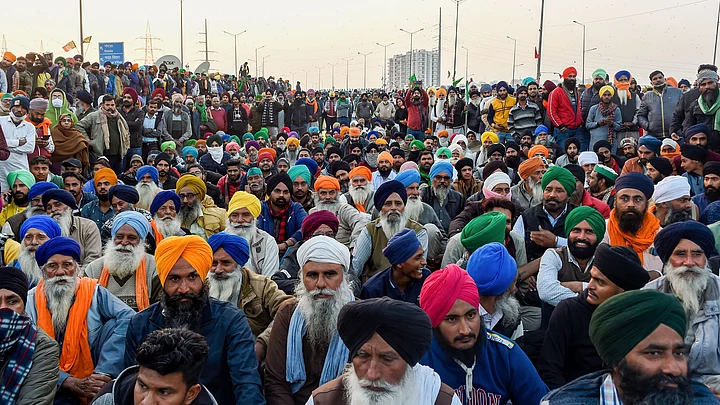The National Human Rights Commission (NHRC) issued notices on Tuesday, 14 September, to the Centre and the state governments of Delhi, Rajasthan, Haryana, and Uttar Pradesh after receiving “several complaints regarding the ongoing farmer's protest”.
The NHRC said in a press release, “There are allegations of adverse impact on the industrial units, seriously effecting more than 9,000 micro, medium, and large companies.”
It has also been alleged that transportation has been “adversely impacted, causing the commuters, patients, physically challenged people, and senior citizens to suffer due to the heavy congestion on roads”.
This comes after thousands of farmers gathered in the Kisan Mahapanchayat, in western UP's Muzaffarnagar on 5 September and in Karnal, Haryana on 7 September.
The farmers' protest started nearly a year ago in Punjab and has been going on at Delhi’s borders for the last nine months against the three contentious farm laws passed by the Centre.
During this time, several hundred protestors have died, braving peak winters, a pandemic, and police brutality.
NHRC’s press release read, “There are also reports that people have to travel long distances to reach their destinations due to the ongoing farmers' agitation and barricades have been put on the borders”, and added that notices have been issued to the Director Generals of Police and Chief Secretaries of UP, Haryana, Rajasthan, and Delhi, asking them to submit their ‘Action Taken Reports’.
“Breach of corona protocols” and inhabitants not being allowed “to move out of their houses due to the blockade of the passage” has also been alleged.
Other Actions Taken by the NHRC:
The Commission has requested the Institute of Economic Growth (IEG) to “examine the adverse impact of the farmers' agitation on industrial and commercial activities/production” and submit a report by 10 October.
IEG has also been asked to examine the disruption of transport services, including inconvenience and additional expenditure.
Meanwhile, to check the break of COVID protocols, the National Disaster Management Authority, Ministry of Home Affairs and Ministry of Health have also been asked to submit reports regarding the “adverse impact of farmers agitation on various aspects and observance of COVID Protocols at the protests sites”.
Since no report had been received from the District Magistrate, Jhajjar, regarding the payment of compensation to the next of kin of a human rights activist who was allegedly gang-raped, and later succumbed to COVID, the NHRC issued a fresh statement asking the DM to file the report by 10 October.
Additionally, the Delhi School of Social Work (DU) has been requested to conduct a survey and submit the report “assessing the disruption of livelihood, lives of people, impact on the aged and infirm persons due to protracted agitation by farmers”.
(At The Quint, we question everything. Play an active role in shaping our journalism by becoming a member today.)
